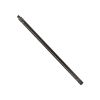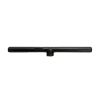AMS 3/4" Threaded Soil Augers
Features
- 3/4" thread for 6" and 7" soil auger diameters
- Economical and secure
- Versatile connection options
- Expedited repair and warranty service
- Lifetime technical support
- More
Threaded Connection
Similar in form to a nuts and bolts system, the AMS threaded connection is reliable and simple to use.
Regular Soil Augers
AMS Regular Augers are designed for use in most soil types. The AMS regular soil auger is commonly used for obtaining disturbed soil samples at or near the surface and for boring to depths where soil samples may be obtained with a separate soil sampler or soil core sampler. The bits of the regular soil auger are open to allow entry of small soil clumps and relatively small rocks and particles.
Mud Augers
AMS Mud Augers utilize a laser-cut, open cylinder design for easy removal of heavy, wet, or clay soils. The AMS mud auger features two openings in the cylinder wall to facilitate emptying as well as wider spaced bits than the AMS regular soil auger to ease entry of sticky soils.
Sand Augers
AMS Sand Augers are designed for use in sands and dry soils. The AMS sand auger uses a closed bit design with a restricted opening to prevent the loss of sampled material during retrieval. The sand auger has a cylinder similar to the regular soil auger, but the inner edges of the sand auger bits touch at their mid point to make the sand auger a much more reliable auger in loose, unconsolidated soil conditions.
Note: Sizes listed are the OD (outer diameter) of the auger cylinder
In The News
Amazon sediment studied through Andes trip down tributary
A team of researchers led by scientists from the University of South Carolina Dornsife traveled to the Peruvian jungle to understand how sediment and plant matter travel down the Andes Mountains and into the Amazon River system, according a first-person account from Sarah Feakins, assistant professor of earth sciences at USC Dornsife. The team focused on a tributary to the Amazon River, the Kosnipata River. They started at the headwaters, traveling up treacherous gravel mountain roads. They ended in the Amazonian floodplain, where Feakins said the river was orange from colloids in the soil. The team spent most of their time collecting and filtering water to obtain sediment samples. Feakins described the work as collecting by day and filtering by night.
Read More50-year fertilizer study shows mixed results on soil quality
A new report authored by researchers from the University of Nebraska-Lincoln suggests that the use of inorganic nitrogen and phosphorus for fertilization improves crop yields, but can have negative impacts on soil quality, the American Society of Agronomy has reported. A study of crop lands in western Kansas has shown that inorganic fertilization increases organic carbon stocks while damaging soil’s structural quality. Researchers collected soil samples from experimental fields fertilized with various amounts of inorganic fertilizers to determine how different nutrient levels might impact soil quality. The results showed that applying nitrogen and phosphorus at high rates can expedite soil erosion and cause other structural issues.
Read MoreFrom Paddles to Phytoplankton: Studying Vermont’s Wildest Lakes
For six months of the year, Rachel Cray, a third-year PhD student at the Vermont Limnology Laboratory at the University of Vermont, lives between a microscope and her laptop, running data. For the other six months, she is hiking and canoeing four of Vermont’s lakes, collecting bi-weekly water samples. Cray studies algal phenology across four lakes in Vermont, US, that have low anthropogenic stress—or in other words, are very remote. Funded by the National Science Foundation Career Award to Dr. Mindy Morales, the lakes Cray researches part of the Vermont Sentinel Lakes Program, which studies 13 lakes in the area and, in turn, feeds into the Regional Monitoring Network, which operates in the Northeast and Midwest US.
Read More






















